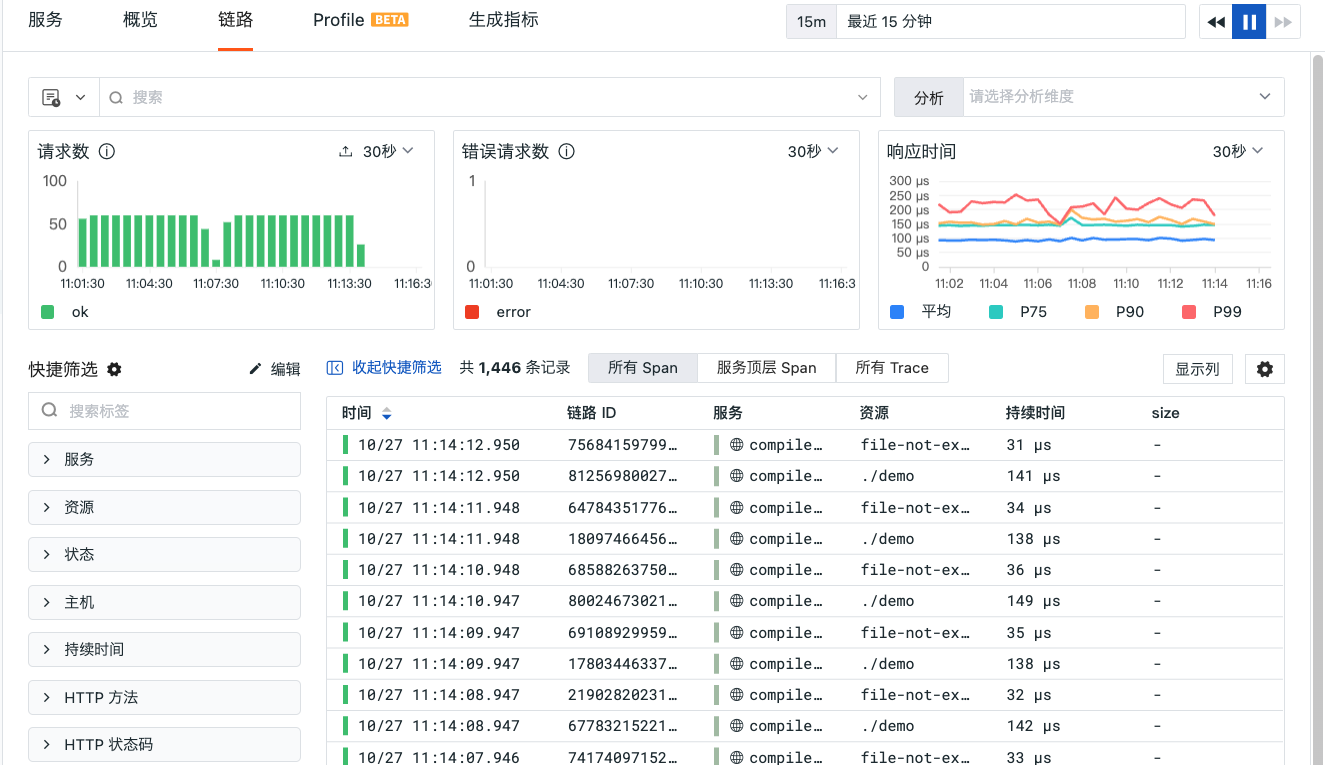DDTrace C++
To apply DDTrace in C++ code, you need to modify the business code, and there is no corresponding SDK integration for common middleware and libraries, manual instrumentation is required in existing business code.
Install Library and Dependencies¶
- Download the DDTrace-C++ SDK
- Compile and install the SDK
# Install dependencies
cd dd-opentracing-cpp && sudo scripts/install_dependencies.sh
# Compile and install
mkdir .build && cd .build && cmake .. && make && make install
If there are problems during the compilation of the SDK, you can temporarily use the header files and dynamic libraries prepared by Guance for testing.
coming soon...
cmake installation
cmake may not be able to install a higher version through yum or apt-get, it is recommended to directly download the latest version from its official website. You can also directly use the source code or Windows binary hosted by Guance.
# Install cmake from source code
wget https://static.guance.com/gfw/cmake-3.24.2.tar.gz
tar -zxvf cmake-3.24.2.tar.gz
./bootstrap --prefix=/usr/local
make
make install
# Verify the current version
cmake --version
cmake version 3.24.2
Install gcc version 7.x:
C++ Code Example¶
The following C++ code demonstrates basic trace instrumentation, simulating a business operation that reads a local disk file.
#include <datadog/opentracing.h>
#include <datadog/tags.h>
#include <stdarg.h>
#include <memory>
#include <chrono>
#include <fstream>
#include <string>
#include <chrono>
#include <thread>
#include <sys/stat.h>
datadog::opentracing::TracerOptions tracer_options{"", 0, "compiled-in-example"};
auto tracer = datadog::opentracing::makeTracer(tracer_options);
std::ifstream::pos_type filesize(const char* filename) {
std::ifstream in(filename, std::ifstream::ate | std::ifstream::binary);
return in.tellg();
}
std::string string_format(const std::string fmt_str, ...) {
int final_n, n = ((int)fmt_str.size()) * 2;
std::unique_ptr<char[]> formatted;
va_list ap;
while(1) {
formatted.reset(new char[n]);
strcpy(&formatted[0], fmt_str.c_str());
va_start(ap, fmt_str);
final_n = vsnprintf(&formatted[0], n, fmt_str.c_str(), ap);
va_end(ap);
if (final_n < 0 || final_n >= n)
n += abs(final_n - n + 1);
else
break;
}
return std::string(formatted.get());
}
int runApp(const char* f) {
auto span_a = tracer->StartSpan(f);
span_a->SetTag(datadog::tags::environment, "production");
span_a->SetTag("tag", "app-ok");
span_a->SetTag("file_len", string_format("%d", filesize(f)));
}
int main(int argc, char* argv[]) {
for (;;) {
runApp(argv[0]);
runApp("file-not-exists");
std::this_thread::sleep_for(std::chrono::milliseconds(1000));
}
tracer->Close();
return 0;
}
Compile and Run¶
LD_LIBRARY_PATH=/usr/local/lib64 g++ -std=c++14 -o demo demo.cc -ldd_opentracing -I ./dd-opentracing-cpp/deps/include
LD_LIBRARY_PATH=/usr/local/lib64 DD_AGENT_HOST=localhost DD_TRACE_AGENT_PORT=9529 ./demo
You can place libdd_opentracing.so and the corresponding header files in any directory, then adjust LD_LIBRARY_PATH and -I parameters accordingly.
After running the program for a while, you can see trace data similar to the following in Guance:
Environment Variable Support¶
Supported Environment Variables¶
The following environment variables are supported to specify some configuration parameters of DDTrace when starting the program, and their basic form is:
Some commonly used ENVs are as follows. For more ENV support, please refer to DDTrace Documentation.
-
DD_VERSIONSets the application version, such as
1.2.3,2022.02.13 -
DD_AGENT_HOSTDefault:
localhostSets the DataKit address
-
DD_TRACE_AGENT_PORTSets the DataKit trace data receiving port. Here you need to manually specify the DataKit HTTP port (usually 9529)
-
DD_ENVSets the current environment of the application, such as prod, pre-prod, etc.
-
DD_SERVICESets the application service name
-
DD_TRACE_SAMPLING_RULESHere a JSON array is used to represent the sampling settings (sampling rate application is in array order), where
sample_rateis the sampling rate, and the value range is[0.0, 1.0].Example 1: Set the global sampling rate to 20%:
DD_TRACE_SAMPLE_RATE='[{"sample_rate": 0.2}]' ./my-appExample 2: Service name wildcard
app1.*, and the span name isabc, set the sampling rate to 10%, otherwise, set the sampling rate to 20%:DD_TRACE_SAMPLE_RATE='[{"service": "app1.*", "name": "b", "sample_rate": 0.1}, {"sample_rate": 0.2}]' ./my-app -
DD_TAGSHere you can inject a set of global tags, which will appear in each span and profile data. Multiple tags can be separated by spaces and commas, such as
layer:api,team:intake,layer:api team:intake
